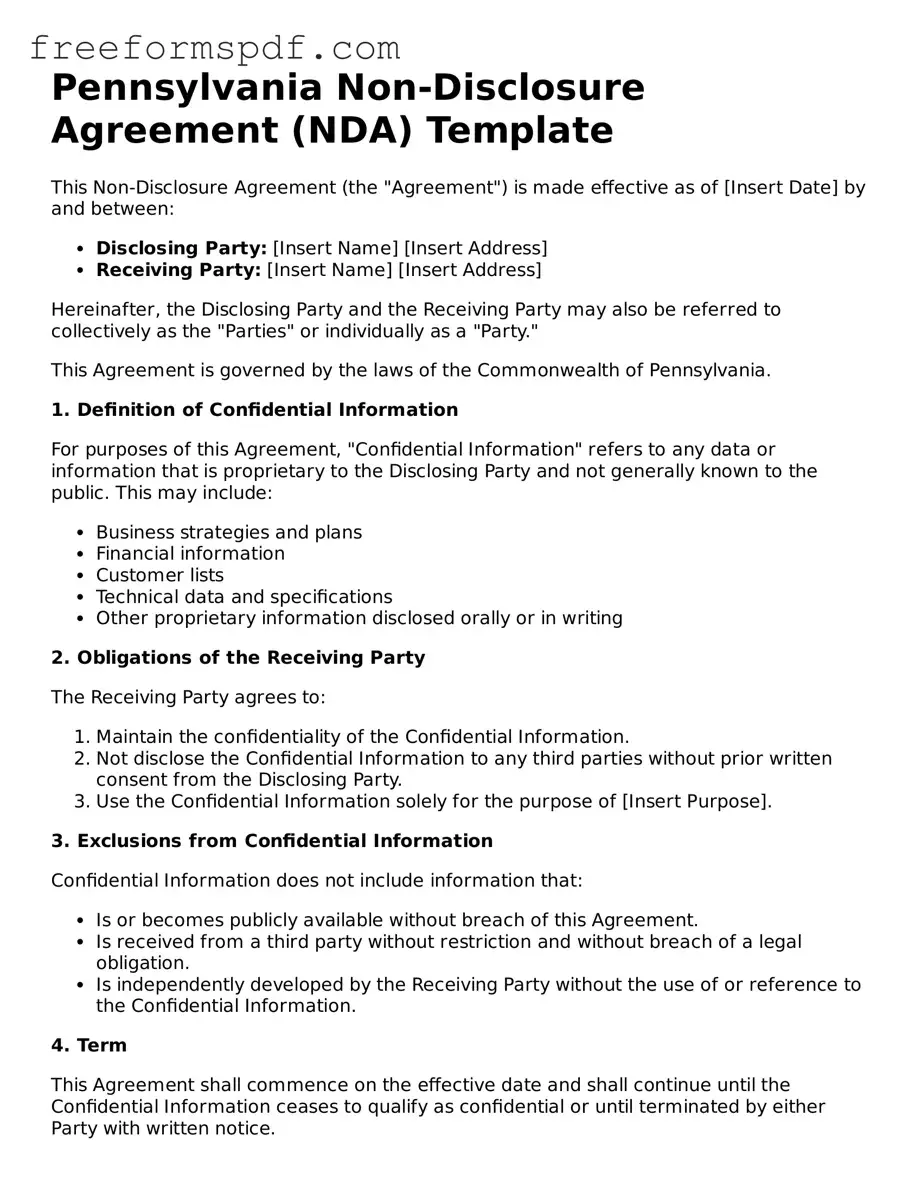Attorney-Verified Non-disclosure Agreement Document for Pennsylvania State
Common mistakes
-
Incomplete Information: Many individuals fail to provide all required information. This can include missing names, addresses, or dates. Each section of the form is crucial for establishing the agreement's validity.
-
Ambiguous Language: Using vague terms can lead to misunderstandings. Clear and precise language is essential to ensure that both parties understand their obligations and rights under the agreement.
-
Not Identifying Confidential Information: Failing to specify what constitutes confidential information can render the agreement ineffective. It is important to clearly outline the types of information that are protected under the agreement.
-
Ignoring Legal Requirements: Some individuals overlook the legal requirements specific to Pennsylvania. Not adhering to state laws can result in an unenforceable agreement, which defeats the purpose of having a Non-disclosure Agreement.
Learn More on This Form
-
What is a Non-disclosure Agreement (NDA) in Pennsylvania?
A Non-disclosure Agreement (NDA) is a legal contract that establishes a confidential relationship between parties. It prevents the sharing of sensitive information disclosed during business discussions or collaborations. In Pennsylvania, NDAs can be used in various contexts, including employment agreements, business partnerships, and negotiations.
-
Who typically uses an NDA in Pennsylvania?
Businesses, entrepreneurs, and individuals often use NDAs. Employers may require employees to sign an NDA to protect trade secrets and proprietary information. Similarly, companies may ask potential partners or investors to sign an NDA before discussing confidential business strategies or financial data.
-
What types of information are protected by an NDA?
NDAs typically protect a wide range of confidential information. This can include trade secrets, business plans, customer lists, financial information, and proprietary technology. The specific information covered should be clearly outlined in the NDA to ensure both parties understand their obligations.
-
How long does an NDA last in Pennsylvania?
The duration of an NDA can vary based on the agreement between the parties. Some NDAs may specify a fixed term, such as two or five years, while others may remain in effect indefinitely. It is essential to define the duration in the NDA to avoid confusion later.
-
What are the consequences of breaching an NDA?
If a party breaches an NDA, they may face legal consequences. The non-breaching party could seek damages for any losses incurred due to the breach. Additionally, the court may issue an injunction to prevent further disclosure of the confidential information.
-
Can an NDA be modified or terminated?
Yes, an NDA can be modified or terminated if both parties agree to the changes. Modifications should be documented in writing and signed by both parties to ensure enforceability. Termination clauses can also be included in the original NDA to outline the conditions under which the agreement may end.
Misconceptions
When it comes to the Pennsylvania Non-disclosure Agreement (NDA) form, several misconceptions often arise. Understanding these can help individuals and businesses navigate the complexities of confidentiality agreements more effectively. Here is a list of seven common misconceptions:
- All NDAs are the same. Many people believe that every NDA is interchangeable. In reality, NDAs can vary significantly based on the specific needs of the parties involved and the nature of the information being protected.
- Signing an NDA means I can’t talk to anyone about the project. While NDAs do impose restrictions on sharing confidential information, they often allow for discussions with certain parties, such as legal advisors or employees, as long as those individuals are also bound by confidentiality.
- NDAs are only necessary for large companies. This is a common misconception. In fact, small businesses and individuals can also benefit from NDAs, especially when dealing with sensitive information or proprietary ideas.
- Once I sign an NDA, I can never disclose the information. While NDAs do create legal obligations to maintain confidentiality, they typically include specific terms that outline the duration of the agreement and conditions under which disclosure is permitted.
- NDAs are not enforceable in court. This belief is unfounded. In Pennsylvania, as in many other states, NDAs are legally enforceable as long as they meet certain requirements and are deemed reasonable in scope.
- Only one party needs to sign the NDA. Many assume that only the party receiving confidential information must sign the NDA. However, it is often beneficial for both parties to sign, ensuring mutual protection and clarity.
- NDAs are only for protecting trade secrets. While NDAs are commonly associated with trade secrets, they can also protect a wide range of confidential information, including business strategies, customer lists, and financial data.
Being aware of these misconceptions can empower individuals and businesses to use NDAs effectively and ensure that their confidential information is adequately protected.
Some Other Non-disclosure Agreement State Templates
What Is an Nda - Fosters partnerships by allowing free exchange of ideas while protecting interests.
When considering a contract to secure sensitive information, understanding the implications of a thorough Non-disclosure Agreement is essential for businesses looking to maintain confidentiality. To learn more about the specific requirements and benefits, visit the vital Non-disclosure Agreement guidelines.
Texas Non Disclosure - Boosts the integrity of professional relationships through confidentiality.
